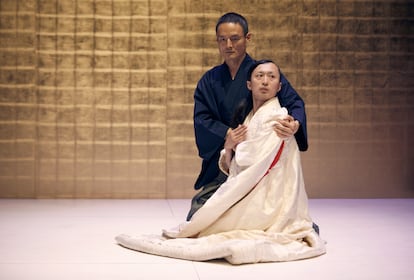The appointment was at five in the morning this Saturday. A bus rented by the Montaña Alta festival organization was waiting for its passengers in the center of Girona: journalists, critics and theater programmers from different parts of Europe. They arrived in small groups, camouflaged among other pedestrians coming out of bars and clubs, but not wanting a drink but a strong coffee. The goal was to reach the Teatre de Salt, on the outskirts of the city, to attend the premiere of Angélica Liddell’s new show, scheduled for a quarter to six.
The newest winner of the National Theater Prize, Spain’s most international creator and leading figure of the avant-garde scene, set the show at that time so that spectators left the theater at 7:45, coinciding with dawn. It’s not a whim. Ancient Japanese samurai practiced at dawn seppuku, the ritual ceremony that precedes harakiri, which literally means “cutting the belly”. This is how the Japanese writer Yukio Mishima committed suicide in 1970, a source of inspiration for this work entitled, precisely, Seppuku. Mishima’s Funeral or the Pleasure of Dying.
Upon arriving at the Teatre de Salt, the café looked like a… after now full of customers. There were other programmers and journalists who arrived alone, but also people who had not gotten up early to go to work, but out of devotion to Angélica Liddell. On Wednesday, Montaña Alta festival director Narcís Puig revealed that tickets for the two scheduled shows (Saturday and Sunday at the same time) were sold out “in four minutes” and that the creator’s original idea was to hold the show outdoors during dawn, but Girona’s weather on these dates made it advisable. Surely they would have sold the same. And he had revealed almost no prior information about the show or given interviews. Surprising? No more than getting up at dawn to go climbing on Sunday or listening to Rosalía’s new album before anyone else. Angélica Liddell has had a religion long before Rosalía created hers.
The expectation for each new work by Liddell is always very high. In his works you can expect everything: he self-harmed, he got drunk, he masturbated and he actually impaled himself. But on this occasion it was dizzying: not only because of the time of the performance, but also because of the taboo theme of suicide as the central axis of the work. To which we must add the uncomfortable figure of Mishima, currently claimed by the Japanese far right for his nationalist ideology and his defense of the warmonger, just like the centenary of his desires.
Mishima’s voice can be heard in the background as the audience settles into their seats. This is a recording of a conference that the writer held at Waseda University in Tokyo in 1968, two years before his suicide: Where has the aesthetics of tragic destiny gone? The work begins with the reading of a fragment of Patriotism, Mishima’s tale, which details his protagonist’s ritual suicide: “Using only his right hand, the lieutenant began to cut his belly from side to side. But as the blade got caught inside, it was pushed back outward by the soft resistance he found there.” It is staged by the dancer Ichiro Sugae and the actor Kazan Tachimoto with traditional movements of Japanese theater before the gaze of Liddell, wrapped in a red kimono.
The scene sets the tone of the show from the beginning: violent but at the same time deeply lyrical, in an intimate and ceremonial atmosphere like the one that floats in the room of a dying person between life and death. During the performance, Liddell projects the photographs she took in 2010 when she imagined her suicide, how she would have been dressed, in what position they would have found her. He also says that last year he saw a woman jump into the void from a roof on Gran Vía. He recites the names of the deceased people and tells the circumstances in which their death occurred (heart attack, suicide, overdose, cancer) while wearing different clothes representative of each of them. He burns the ashes which he claims are those of his parents. They caress and kiss the smoke they generate with an exciting tenderness. He brings two nurses on stage to draw blood from his and actor Kazan Tachimoto’s veins. Two spectators leave the room unconscious. He masturbates with calf’s liver.

Death is the raw material that nourishes Mishima’s literary work and also all of Liddell’s performances since he began his career more than three decades ago. “I consider everything from the perspective of my death. I don’t know how to live, I don’t know,” the creator said in an interview with EL PAÍS in 2021. But the death drive, at 59, is increasingly stronger. Especially in his last two works, with which this one Seppuku it could constitute a trilogy: Voodoo (3318) Blixen, a monumental montage staging his funeral, premiering in 2023 on this same stage; Damon. Bergman’s funeralwhich opened the Avignon festival in 2024. A question he posed to the latter, in fact, is repeated in the final monologue of Seppuku like a refrain: “When will I die?” And also: «I ask for the end of life».
Liddell is twinned with Mishima on an aesthetic level. She invokes him from the stage, like a priestess, to confront her spectators with death. She invites them to get up at four in the morning to face her bareback and, in doing so, strip the theatrical ceremony of any banal context. At the end the audience responded with hearty applause. When we left it was already dawn.
big Bang
The first of Sepukku, which already has performances scheduled in Strasbourg, Vienna and at the Grec festival in Barcelona, was one of the highlights of the current edition of the Montaña Alta festival, which began on September 18th and will last until December 12th. This week was particularly intense because the Big Bang was celebrated, with a high concentration of avant-garde shows bookable for tours, with the presence of around a hundred national and international programmers. Among these, the latest creations of the Belgian Miet Warlop, the Argentine Marina Otero, the Catalan company Agrupación Señor Serrano and the duo Pau Matas-Oriol Pla were seen.
The latter, who opened the series on Thursday with a wonderful display of his acting skills in the show Throat, After the show he hopped on a plane to attend the International Emmy ceremony in Los Angeles this Monday, where he will compete for the best actor award for the series. I, a drug addict, by Javier Giner.



